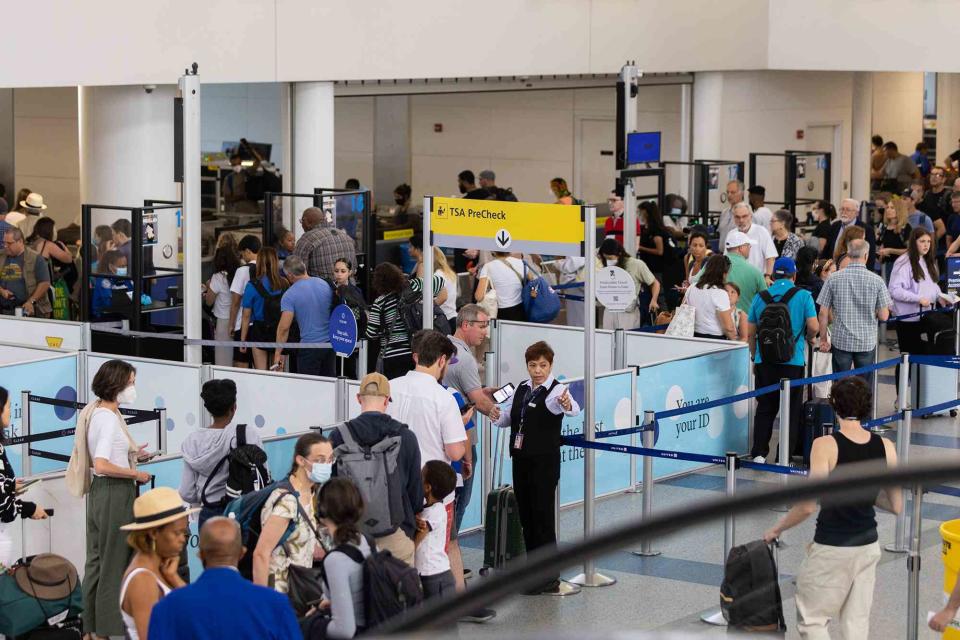A U.S. Government Shutdown May Be Approaching — Here's How It Will Affect Travel
The shutdown would take effect on Oct. 1 if lawmakers don’t pass a federal budget or stopgap measure.

Jeenah Moon/Getty Images
As the federal government inches closer toward a government shutdown, travel will remain largely the same for Americans if it indeed happens. However, in the event of a shutdown, travelers may feel the effects in various situations.
This week, Transportation Secretary Pete Buttigieg warned that a shutdown would make the current air traffic control staffing shortage worse, resulting in the furlow of 1,000 air traffic controllers who are currently undergoing training in an interview with Politico.
“A shutdown would stop all of that progress,” Buttigieg told Politico. “It would mean we have to immediately stop training air traffic controllers and furlough 1,000 controllers who are already in the training pipeline.”
Buttigieg added that even a short shutdown that only lasts “a few days” would result in the failure to meet staff and hiring targets for next year.
Airlines for America, which represents major carriers across the country, has said the New York Terminal Radar Approach Control facility remains only 54 percent staffed. Throughout all of this, the FAA has said it is working with the National Air Traffic Controllers Association (NATCA), the union representing controllers, to solve the problem.
The FAA has told Travel + Leisure the agency plans to hire 1,800 air traffic controllers next year, an increase from the 1,500 controllers hired this year.
The Impact on Day One
The shutdown would take effect on Oct. 1 if lawmakers don’t pass a federal budget or stopgap measure.
Air travelers are not likely to notice the effects right off the bat as air traffic controllers and Transportation Security Administration officers, are "essential" employees and will continue working, albeit without pay for the moment.
“The longer it lasts, the bigger the impact we will potentially face as travelers,” Katy Nastro, a travel expert with Going.com, told T+L. “If I’m a TSA agent, I'm coming to work because I’m essential, but I’m not getting paid. After a certain point — and this happened in 2019 — some people called out sick and it got to be a bigger problem.”
Nastro said the “breaking point” is typically about two weeks.
“We don't want this to happen, but the old adage ‘pack your patience’ might come into effect the longer this goes on,” Nastro added.
National Parks May Be the Most Affected
Where travelers may see an immediate impact would be in national parks. Nastro said about a third of national parks closed down during the 2018 shutdown.
“For the more popular ones, the highly trafficked national parks, those types of parks have contingency plans. But that's not a guarantee for all of the parks,” Nastro said. “It’s basically up to the state.”
Arizona’s Gov. Katie Hobbs, for example, has said she will provide funding to keep Grand Canyon National Park open, according to The Arizona Republic.
“Arizona should not have to suffer because of the federal government’s inaction,” Hobbs told the paper. “The Grand Canyon is a pillar of our state and provides good paying jobs for hundreds of Arizonans while showcasing one of the seven natural wonders of the world to those who visit. I am proud to offer resources to keep the park open and am committed to ensuring Arizonans are protected from Washington’s failure.”
It’s unclear exactly which national parks will remain open in the event of a shutdown, but travelers can look to the past for some guidance. In 2018, Yellowstone National Park, for example, continued to welcome visitors, but closed all government-run operations and facilities and stopped staffing entrance stations.
American Travelers Are Canceling Plans
A government shutdown may not affect many aspects of travel right away — especially private companies like Amtrak and cruise lines — but that hasn’t stopped 60 percent of Americans from saying they would cancel or avoid trips by air if a shutdown does happen, the U.S. Travel Association shared with T+L.
“I think it’s incumbent on us to help people understand the consequences of their decisions,” U.S. Travel Association CEO Geoff Freeman told reporters at the Skift Global Forum 2023. “We expect the travel economy will lose $140 million a day because of what’s about to happen.”
For more Travel & Leisure news, make sure to sign up for our newsletter!
Read the original article on Travel & Leisure.

